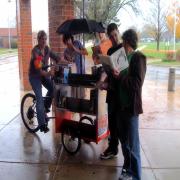Saturday’s post on the censorship issues surrounding the Teen Lit Fest In Humble, TX led to a wonderful series of comments and ongoing discussion. Thanks again to everyone who has chimed in.
One reader wrote in with a link to a censorship lesson plan for 3rd – 5th graders.
Janni Lee Simner wrote about the difference between a boycott and a strike and came to the conclusion that the authors who pulled out of the book festival were closer to workers striking because of working conditions instead of participating in a boycott. I agree; it’s an important distinction.
This strike would have the most impact if the financial loss suffered by the festival organizers put a severe hurt on the decision maker(s). Or if they decided never to hold the festival again because of the hullabaloo. This would be awful for the readers in the Humble, TX, but I really doubt it would affect the decision makers. Their full-time job is supported by tax payers.
Unless and until the citizens of Humble rise up and holler about the decision to cancel Ellen’s appearance, and the subsequent pulling-out of the other authors, I don’t see how this strike can affect change within the festival or community at the heart of it.
However, Matt de la Peña made an excellent point in his comment to my post on Saturday. Matt wrote:
“If all the other authors (myself included) had chosen to attend the festival it could certainly have lead to a healthy discussion about censorship within the context of one group of people.
But by NOT attending the festival (creating awareness) my hope is that it prompts this same conversation among MANY groups of people.”
That seems to be working, at least in the blogosphere. The crusty, cynical part of me worries that a discussion of intellectual freedom on blogs written by and read by lovers of YA fiction is a classic example of preaching to the choir. How do we engage in conversation with the people who disagree with us?
Striking workers can refuse to do their jobs until working conditions change. As Janni points out in her post, censorship qualifies as a working condition for writers.
One of my concerns is that a strike like this forces the decision makers underground. Instead of inviting someone who might be controversial at all, they simply won’t issue the invitation in the first place. They’ll stick to authors who write books that deal with situations that don’t make censors break out in hives. And the censors will win again and the readers will lose.
But doing nothing isn’t exactly an option either, is it?
Perhaps our community should start talking with regional and national groups of school superintendents. Maybe with the help of NCAC? (If you haven’t checked out their Kids Right to Read Project yet, do it today.)
What do you think?
Ready… “One often hears of writers that rise and swell with their subject… How, then, with me, writing of this Leviathan? Unconsciously my chirography expands into placard capitals. Give me a condor’s quill! Give me Vesuvius’ crater for an inkstand!” Herman Melville, Moby Dick
Set… turn off the phone and Internet. Put on some music, if you want. Loud or soft; your call.
Today’s prompt: Have you drawn a map for your story? Do you know what the layout is of your character’s neighborhood? House? School? Mall? Draw what you know first….THEN (brace yourself, here comes the fun part) fill in things that you don’t know. Like, what three uses is the guest bedroom put to? What happens in the basement? Above the garage? Who lives past the bus stop? Who works in the store next to the theater? What impact do these folks have on the life of your character?
If you are responding to prompts from your own life, draw a map of your world when your were 5, or 10, or 15. As you draw, keep a notebook to scribble in, and write down memories of the places. Seek the most precise details that you can remember. If you can’t remember, make it up. You are a writer, after all.
Scribble… Scribble…Scribble!!!






